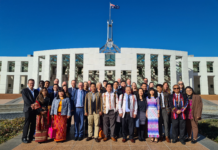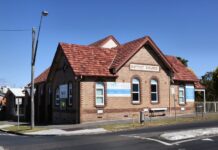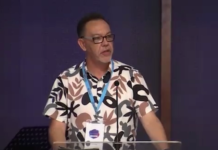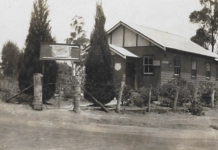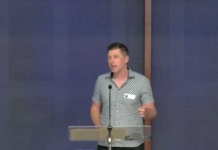
There is something daunting about a principal’s office. As I approached the Office of Ross Clifford, principal of Morling Theological and Bible College, my mind momentarily flashed back to the all-too-often consequence of a misspent youth – the Principal’s Office.
The principal always seems larger than life: respected by teachers, feared by some students and aspired to by others, and Ross is no exception to the stereotype. Ross greeted me at the reception of Morling College, towering over my meagre 6ft2in height personifying the larger than life career he has been blessed with, and led me to the office.
I sat awkwardly, nervously looking around for a cane and preemptively apologising for my limited interviewing experience, fighting the urge to refer to Ross as ‘Sir’ or ‘Mr Clifford’. Where was I going to start? Should I start with his academic career, leading and lecturing the college? Maybe his broadcasting, political, legal and social justice endeavours? I guess I should start at the beginning.
‘You grew up in Sydney?’ I questioned, reflecting quickly on how absurdly obvious and predictable the question was.
Ross explained that he grew up in Chatswood and was just an average kid kicking around the streets and playing cricket and rugby.
He continued to expand on the obvious intent of my question.
‘I gave my life to Jesus at the age of 8. It was a Billy Graham Crusade and I responded to the message of grace that was offered.’
He spoke through the difficult time he faced as an early teenager having left home and being forced to live on the streets of Adelaide. It was during this time that Ross began to understand the reality of the church and the love of Jesus.
‘I walked into some churches and was completely ignored. Churches seemed to struggle to respond to the desperate yet practical need that I had.’
I realised that the initial apprehension that I felt walking into the principal’s office had faded and I was completely absorbed in the story of his life.
‘What was the biggest challenge in your walk with Jesus?’ This time the question was of genuine interest.
 Ross spoke about the times he had spent as a lawyer working in Kings Cross during the times so dramatically portrayed in Channel 9’s ‘Underbelly’. ‘It got to the point where there was too much pressure to compromise.’ He paused and thought briefly about how much he could share. ‘All I could do was advise my clients, but their interest was more about survival than my legal advice.’
Ross spoke about the times he had spent as a lawyer working in Kings Cross during the times so dramatically portrayed in Channel 9’s ‘Underbelly’. ‘It got to the point where there was too much pressure to compromise.’ He paused and thought briefly about how much he could share. ‘All I could do was advise my clients, but their interest was more about survival than my legal advice.’
This period of his life was the catalyst for Ross to begin to question how he could best serve God. ‘What was the best time in your faith?’ I asked, really wanting to know more about the whole ‘Underbelly’ experience.
‘When my father died.’ My stunned expression prompted him for greater detail. ‘I walked into the hospital after dad’s death feeling all the emotions that you would expect, but when I saw his body, it hit me in the most amazing way that dad was not there any more. It was unusual, but in that moment I had the greatest revelation of what faith is about and the wonderful message that death is not the end.’
I could do nothing but nod and move onto the next question. ‘You wear many hats: lawyer, pastor, evangelist, author, journalist, broadcaster, student, politician, teacher, leader, and, I am sure, many more. What principles do you carry through each of these roles?’
‘Duty. Who we are in Christ and what that entails. We have a duty to live a life that represents Jesus. Human dignity for all would also be key to what I do. Whether it is as a pastor, radio host or politician, I always felt driven by a belief in the human dignity of every person I dealt with. And I guess the transformational power of the Gospel. I actually believe that the Gospel has the power to transform a person.’
‘What do you see as your primary or favourite role?’
‘I am a pastor. My greatest memories in ministry all revolve around being a pastor.’ The expression on Ross’s face changed and a look of joy, reflecting the memory he was drawing on, overtook his face. ‘I baptised around 80 people at Windsor and around 200 at Gymea and every single one was the most amazing experience. What an honour! The only thing that would come close to these would be every wedding I have done.’
It was hard to not get caught up in the memory and share stories or give a little Pentecostal ‘Amen!’, but I pressed on.
‘I know that you have had to deal with a lot of criticism. How does it affect you?’
‘It is hard. I appreciate criticism when it is constructive, in an environment that is edifying and allows for growth and development, but all too often, criticism is based on ignorance. A person or a group will attack you with no real understanding of what you are actually doing and give you no real opportunity for a response to correct erroneous ideas. One wet blanket can put out five hundred candles. Never let criticism define who you are or what you do. Listen to it, evaluate it, allow it to make you better, but never let it extinguish what God has called you to do.’
The extrovert in me finally wrestled the introvert to the floor and the ‘Amen’ leapt from my mouth.
‘What is the biggest challenge and moral issue facing Baptist churches today?’
 ‘Many people are over the church. They see the church as abusive, hypocritical, immoral, judgemental – the list goes on. This may or may not be the reality, but that is our challenge. The church needs a prophetic voice to rise up, and for the cause to be addressed. We as a denomination, as individual congregations and as followers of Jesus, need to ask the question, “What are we doing to communicate the Gospel of Jesus in our everyday life?” Our moral challenge is to overcome the lack of duty of care the church has had. Sexual abuse, harm to the most vulnerable, and the viewing of people as too dirty for church, all need to be overcome and in many ways the church is now addressing that need. We just need to start living out Jesus.’
‘Many people are over the church. They see the church as abusive, hypocritical, immoral, judgemental – the list goes on. This may or may not be the reality, but that is our challenge. The church needs a prophetic voice to rise up, and for the cause to be addressed. We as a denomination, as individual congregations and as followers of Jesus, need to ask the question, “What are we doing to communicate the Gospel of Jesus in our everyday life?” Our moral challenge is to overcome the lack of duty of care the church has had. Sexual abuse, harm to the most vulnerable, and the viewing of people as too dirty for church, all need to be overcome and in many ways the church is now addressing that need. We just need to start living out Jesus.’
‘What advice would you give to followers of Jesus who desire to face that challenge?’ I asked, taking notes now for my own faith journey rather than the article.
‘The All Blacks rugby union team base their success on three Ps – Position, Possession and Passion. Our success is based on the same. Position on the field, trying to be in the opposition’s half, shows us that we need to get out and be where the people are. Possession of the football shows us that we need to have possession of the Holy Spirit and the word to truly make inroads. Passion is exactly that: are you passionate about what you believe and what you are doing?’
As I left the principal’s office I had to reflect on the experience. It is a truth that the principal of an institution has many functions, but at their core, they are teachers desiring to impart learning. This happens sometimes at the end of a cane or a pat on the back. I left having learnt something about Ross Clifford and with a challenge to look at and offer all humanity the love and dignity that God offers.
All in all, a better experience than I remember.


















